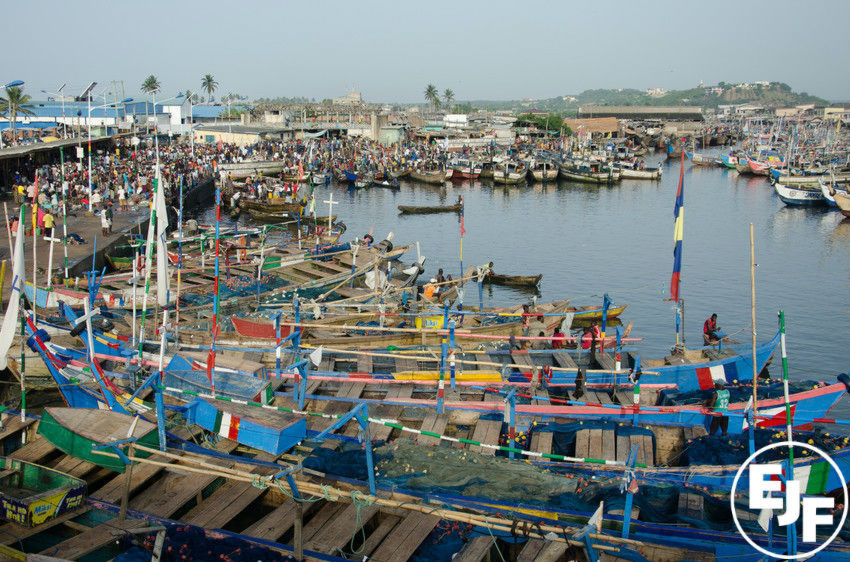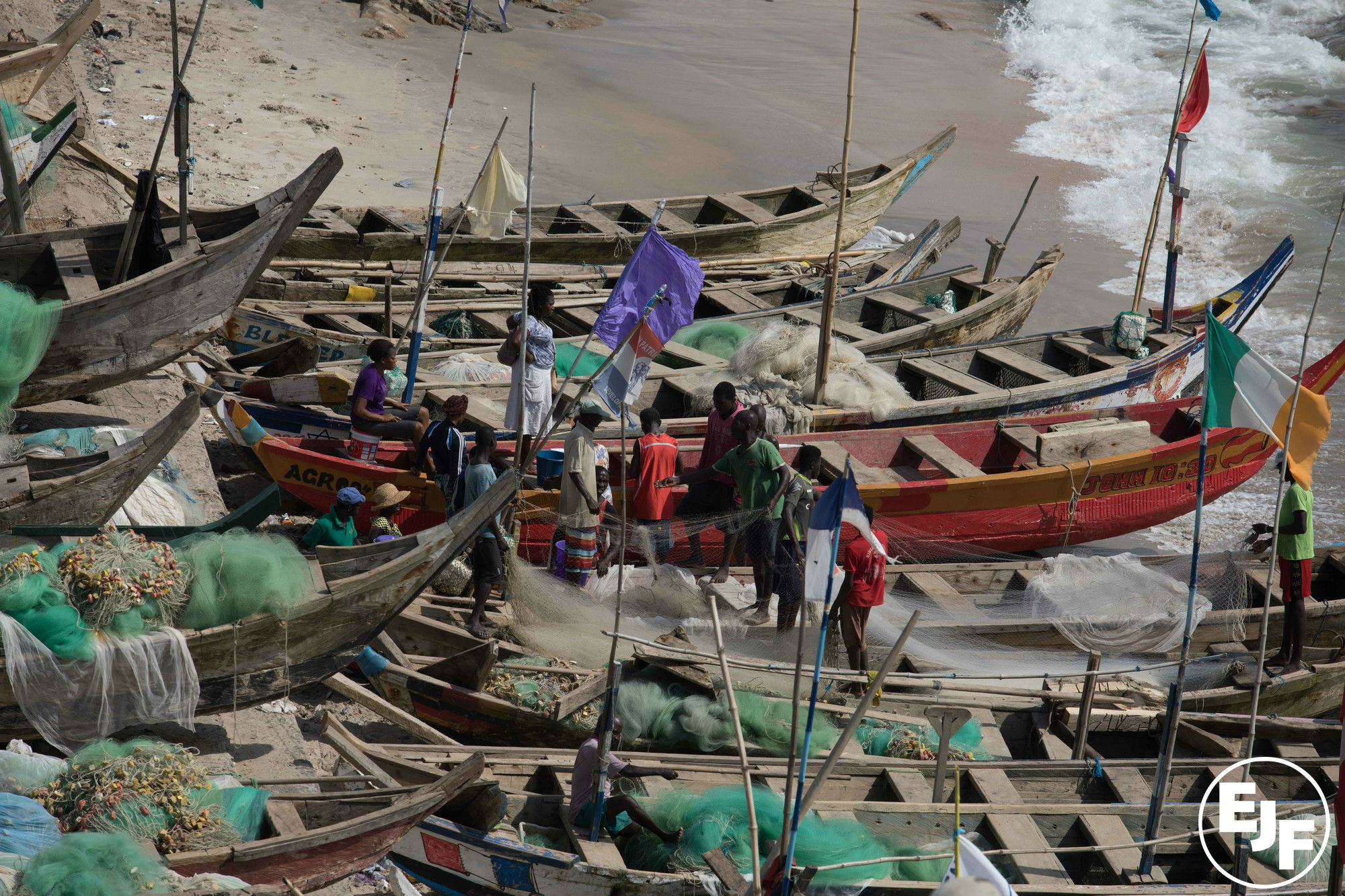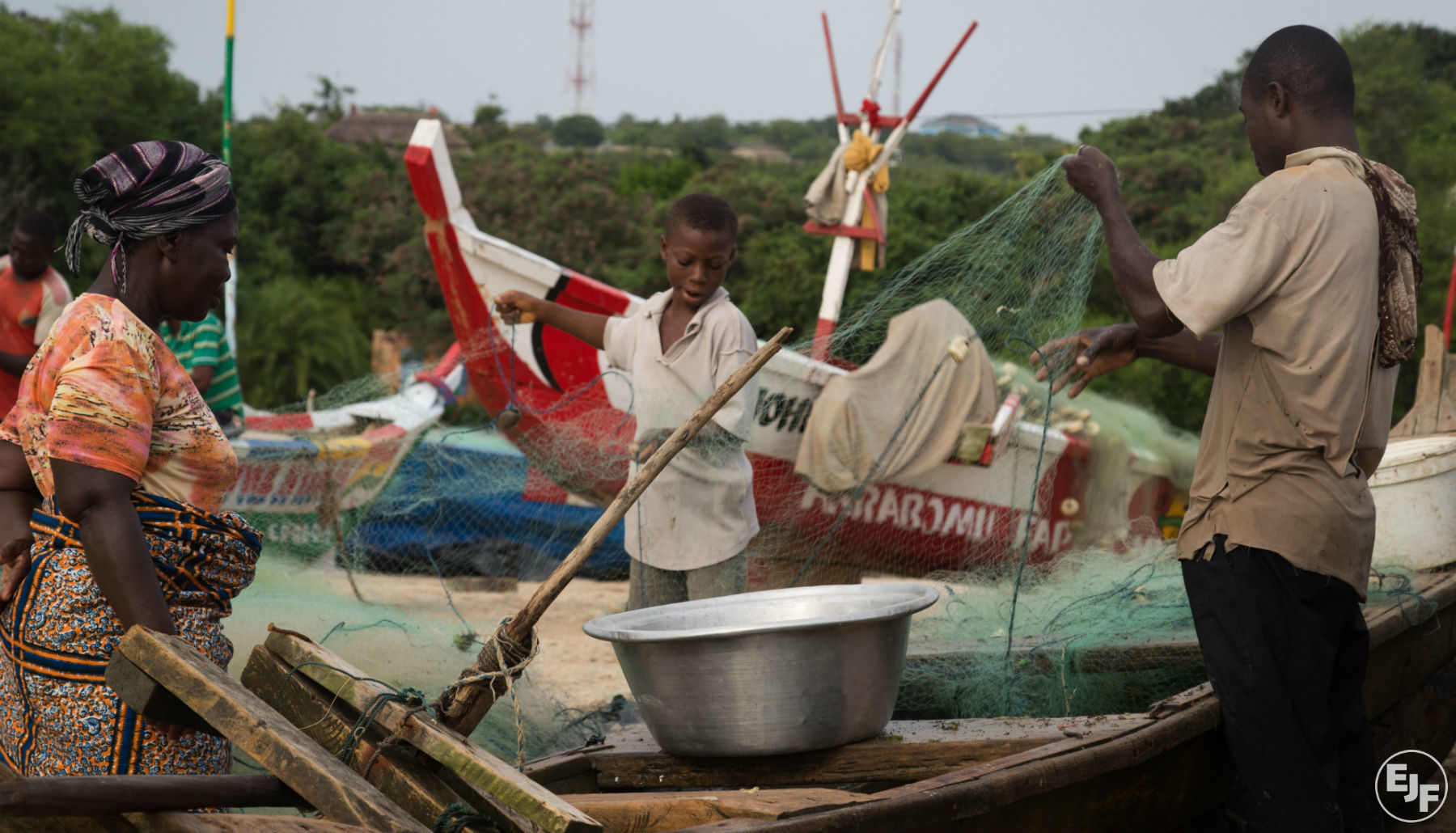
New film reveals extent of Ghana’s fishing crisis
On the world’s first awareness day for illegal, unreported and unregulated fishing, a new film by the Environmental Justice Foundation (EJF) and Hen Mpoano reveals the true extent of the crisis in Ghana’s fisheries. In particular, the illegal practice of ‘saiko’ – where industrial trawlers sell fish to local canoes at sea – is driving the collapse of Ghana’s inshore fishery, on which millions of Ghanaians rely for food security and income.
Ghana’s fish stocks are in steep decline, with landings of key species for local consumption at their lowest recorded level since 1980. Traditional fishing communities have been hit hardest, with average annual income per canoe dropping by as much as 40% in the last 10 to 15 years.
The film, Ghana: A Fishing Nation in Crisis, which will premiere on Ghanaian TV, was produced under the EU-funded Far Dwuma Nkɔdo Project, a partnership between EJF and Ghana-based NGO Hen Mpoano. After the screening, a panel, including academics and representatives from the Ghana National Canoe Fishermen Council and the Fisheries Commission, will discuss the urgent need to protect Ghana’s fish stocks.
Ghana’s fishing industry has been plagued by illegal activities in recent years. Destructive fishing practices and over-exploitation by industrial trawlers have driven local fishers facing plummeting incomes to turn to illegal fishing with light, dynamite, and chemicals. These are quick fixes for fishers in a desperate situation that are causing irreparable damage to remaining fish stocks and, in some cases, risking human health.
One practice, referred to locally as saiko, is precipitating an ecological and human catastrophe. Originally an informal trading system, where unwanted industrial bycatch would be exchanged at sea for fruit and livestock brought by canoes, it is increasingly a part of targeted fishing for the trawlers.
This puts industrial fishing vessels in direct competition with small-scale fishers for catches of species such as sardinella that are a staple food for local communities. Having effectively ‘stolen’ fish from canoe fishers, saiko operators sell these back to the same fishing communities for profit.
Saiko is a highly organised and lucrative practice, accounting for an estimated 100,000 tonnes of illegal and unreported catches in 2017, with an estimated landed value of US$34-65 million. The statistics reveal the stark inequality of this trade: an average saiko canoe can return with as much 400 times the amount of fish as a canoe fishing trip.
Steve Trent, EJF’s executive director, says: “The implications of the imminent collapse of Ghana’s small pelagic fishery cannot be overstated. Over 2 million people in Ghana rely on fisheries for their livelihoods, with limited alternative sources of income or employment. Should the resource disappear, mass migration and social upheaval can be considered a very real prospect.”
It is not too late to save Ghana’s fisheries. Saiko remains illegal in the country, and robust enforcement of this law could effect real change.
Kofi Agbogah, director of Hen Mpoano, says: “Transhipments of fish at sea are notoriously difficult to monitor, even with the most advanced systems in place. Instead, all catches should be landed in authorized ports and recorded in official statistics to inform sustainable management. This would also ensure that restrictions on fishing gear that prevent the capture of non-target species are complied with.”
Nana Solomon from the Ghana National Canoe Fishermen Council, who will be member of the panel on Tuesday, says “The voices of small-scale fishers and fishmongers must be heard when it comes to designing Ghana’s fisheries management, to help create policies that are fair and sustainable.”
ENDS
Notes for editors:
Watch the film: Ghana: A Fishing Nation in Crisis
Read the EJF briefing: The Problem with “Saiko”: An Ecological and Human Catastrophe
Images and interviews available on request.
Saiko is illegal under Ghanaian law attracting a fine of between US$100,000 and US$2 million (Section 33(2), Fisheries Regulations 2010 LI 1968 and Section 132, Fisheries Act 2002, Act 625), or at least US$1 million where catches involve juvenile fish or the use of prohibited fishing gears (Fisheries (Amendment) Act 2014, Act 880).
There are currently around 70 industrial trawlers licensed to fish in Ghana’s waters for bottom dwelling species such as groupers, snappers, octopus and cuttlefish.
According to the UN Food and Agriculture Organization, illegal, unreported and unregulated (IUU) fishing activities are responsible for the loss of 11 to 26 million tonnes of fish each year, which is estimated to have an economic value of US$10 to US$23 billion. Rates of IUU fishing in West Africa are amongst the highest in the world, accounting for 37% of catches.
About Far Dwuma Nkɔdo:
The three-year (2017-2019) project is being implemented by the Environmental Justice Foundation (EJF) and Hen Mpoano with the financial support of the European Union and German Federal Ministry for Economic Cooperation and Development (BMZ). As part of this project, EJF and Hen Mpoano are working to help drive a reduction in illegal fishing, and give local fishers a voice in the process to build a more sustainable fishing sector:
- Through a unique combination of local surveillance and remote monitoring, we are strengthening the monitoring and reporting of illegal fishing, and empowering local communities to document illicit fishing activities.
- We are working to empower small-scale fishers, vulnerable and marginalised groups to articulate their interests in fisheries reforms and implement fisheries co-management.
- We are promoting alternative livelihood options for small-scale fishing communities, helping them to diversify their local economies and to reduce their dependence on fishing.
For more information, visit www.ejfoundation.org or www.henmpoano.org
The Environmental Justice Foundation is an international non-governmental organisation working to protect the environment and defend human rights. EJF is a charity registered in England and Wales (1088128). www.ejfoundation.org
Hen Mpoano is a non-profit organization based in Ghana. Its vision is for inclusive and integrated management of Ghana’s coastal and marine ecosystems to generate long-term socio-economic and ecological benefits. www.henmpoano.org
Contact:
Daisy Brickhill - EJF Press & Communications Coordinator
daisy.brickhill@ejfoundation.org
Tel: +447871946911
SIGN UP FOR OUR EMAILS AND STAY UP TO DATE WITH EJF

